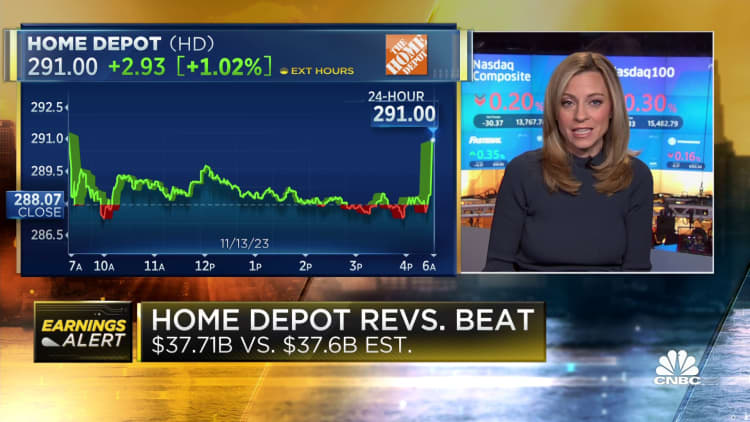
Home Depot's quarterly sales declined 3% from the year-ago period, but topped Wall Street's expectations as customers chipped away at more modest projects and home repairs.
The company indicated caution about the coming months and narrowed its full-year outlook. It said it now anticipates sales will fall by 3% to 4% from the prior year, compared with a previous expectation of a 2% to 5% decline. Home Depot expects earnings per share to slide by 9% to 11%, compared with prior guidance of a 7% to 13% drop.
Shares closed the day at $303.63, up 5.4%, after Home Depot said many trends had started to normalize after years of upheaval following the Covid pandemic. Prices have settled after a bumpy ride from inflation. Appliances are in stock again, which has helped support sales. And promotion levels have reverted to pre-pandemic levels, bolstering profits.
Still, Home Depot has not emerged entirely from a tough stretch for its business. In an interview with CNBC, Chief Financial Officer Richard McPhail said the company's results reflect that this year "is a period of moderation in home improvement."
"A customer who might have remodeled their entire home may be opting for a partial remodel," he said. "Maybe they won't redo their entire kitchen. Maybe they'll just do the countertop and backsplash. And so it's really just the downscaling of projects that we've seen."
Here's what the retailer reported for the fiscal third quarter ended Oct. 29 compared with what Wall Street was anticipating, based on a survey of analysts by LSEG, formerly known as Refinitiv:
- Earnings per share: $3.81 vs. $3.76 expected
- Revenue: $37.71 billion vs. $37.6 billion expected
Home Depot reported net income of $3.81 billion, or $3.81 per share, down from $4.34 billion, or $4.24 per share, a year earlier. Revenue fell from $38.87 billion in the year-ago period.
Comparable sales declined 3.1% year over year, a drop that wasn't as deep as the 3.6% analysts expected, according to Factset. However, it marked the fourth straight quarter of falling comparable sales, an industry metric that takes out the effect of store openings, closures and renovations.
Home Depot has faced dual challenges over the past year: elevated mortgage rates have squeezed potential homebuyers, and high inflation makes big-ticket items and major renovations a tougher sell.
In recent quarters, customers have pulled back on pricier projects and items — a trend that continued in the most recent quarter, McPhail said.
The housing market has had a mixed effect on Home Depot's sales, as mortgage rates rise, home values remain high and supply stays low, McPhail said. On the one hand, he said, customers aren't moving as much and taking on projects that typically come with a new home. Yet on the other hand, some have chosen to spruce up the house where they have a lower fixed-rate mortgage.
"We don't quite know how to quantify that balance," he said. "And obviously that's something we'll watch as we progress into next year."
Customer transactions fell to 399.8 million from 409.8 million in the year-ago period. When shopping online and in person, customers' average ticket was $89.36, roughly the same as a year earlier.
Even before those dynamics intensified, Home Depot anticipated sales would decrease, after so many homeowners ticked off kitchen remodels, painting projects and more during the Covid pandemic. McPhail has also noted a shift in budget priorities to experiences, such as vacations and concerts.
Still, he said Home Depot's customers are in good shape financially.
"The consumer — and particularly the homeowning consumer who is our customer — is healthy," he said. "They're employed. They've seen income gains and wealth gains in recent years. They have excess savings and they remain engaged in home improvement."
— CNBC's Robert Hum contributed to this report.
Don't miss these stories from CNBC PRO:
- Warren Buffett has been selling stocks including Chevron and hoarding a record level of cash
- Bernstein says to buy these crypto stocks to play the expected bitcoin ETF and halving
- Bank of America says there are two things that will drive the next bull run in stocks
- The market just triggered a rare signal that has meant higher returns a year later 100% of the time


